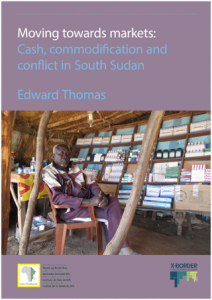Fifty years ago, most households in South Sudan produced the grain they ate, organizing agricultural labour and distributing small surpluses mostly through kinship and other social networks. Now, the majority of households buy most of their food. This transition from self-sufficiency to market dependence took place during long wars, which transformed or distorted almost every aspect of everyday life. It is a transition that now seems to be irreversible. This report therefore looks at how South Sudan’s subsistence system, which organized the production and distribution of wealth around kinship and social networks, is being replaced by a market economy, and what the consequences of this are for the country and its people.
The report is a product of the X-Border Local Research Network, a component of DFID’s Cross-border Conflict—Evidence, Policy and Trends (XCEPT) programme. The programme carries out research work to better understand the causes and impacts of conflict in border areas and their international dimensions. It supports more effective policymaking and development programming and builds the skills of local partners. The report was written by Eddie Thomas, an RVI Fellow. Listen to Eddie give an interview to Radio Miraya on the report.




